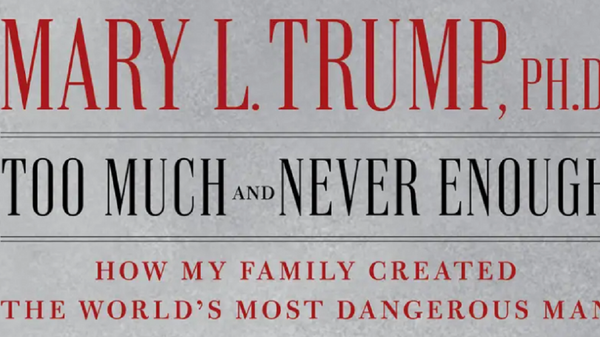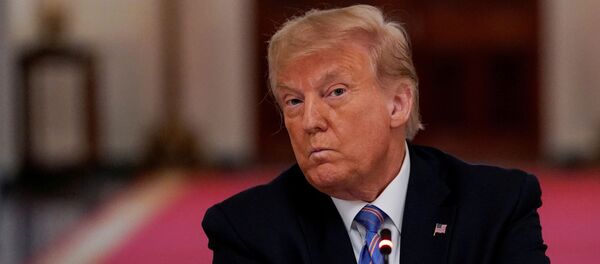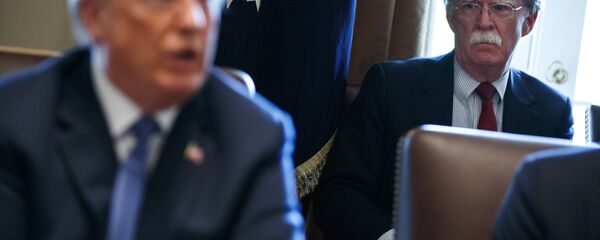Mary Trump’s new exposé on her uncle has shot up to number one on Amazon’s bestseller books list before even coming out.
Previews of the book released to the media this week promise to reveal a number of new and highly personal details, including Donald Trump’s relationship with his cold and unloving father, the death of his older brother from alcoholism, the billionaire’s “twisted values,” and “toxic” personality, and lewd remarks he allegedly made about his niece back in the 1990s.
“Neither of these two books is going to make the sky fall in Washington,” says Jonathan Power, a veteran US foreign affairs columnist, filmmaker and author.
“If President Donald Trump was bulletproof before he certainly still is now. And so is his wife Melania, as she lives under his protective umbrella. As he once said, if he walked down 5th Avenue and shot someone dead none of his supporters would turn a hair.”
Part of the problem with “gossip books” like these, according to Power, is that “there is no way of the reader knowing” if they’re telling the truth, or hiding it. “They’re not analytical nor rigorous.”
That said, books of this kind cannot be dismissed entirely, and their authors should “be taken seriously given their intimacy with the subject,” Power believes.
“There are obvious reasons for having some doubts about the veracity of these books,” University of Toronto American politics professor Ryan Hurl says. “Even if we assume that the authors in question have done their best to be truthful, we would have wondered whether their personal relationships with Donald Trump or Melania Trump have distorted their interpretations of the facts.”
Part of the problem, Hurl argues, is that many of the people in a position to write such ‘tell-all’ accounts based on their personal experience with powerful people don’t have the context to put their experiences into historical perspective.
“They are not well read, in other words. For instance, we might wonder whether Trump’s niece has had the time to read Robert Caro’s four volume biography of Lyndon Johnson. While there are many different lessons that you can take from that work, one is that the desire for power is often accompanied by unsavoury personal characteristics. Lyndon Johnson achieved great things as a President, and yet he was certainly both a bully and liar - and worse things as well,” the professor explains.
“The problem, I think, is that claims about Trump’s personal characteristics - he is a liar, a narcissist, etc. - are used to justify extraordinary measure; journalists reject norms of objectivity, federal officials reject norms of due process, and so on. While Trump was, I think objectively, one of the least experienced and least qualified individuals to become President, I have not been impressed by claims that he is uniquely immoral, corrupt, and so on,” Hurl stresses.
In any event, the professor argues that for the most part, “most Americans know what they think about Trump’s character,” meaning books like Bolton’s and Mary Trump’s probably won’t have much of an impact when it comes to his chances at reelection, unless they reveal some outright criminal activity.
Over the past three years, the White House has battled virtually every book about the president that's been released, either dismissing the authors and alleging a lack of credibility, or, in the case of both Bolton and Mary Trump, (unsuccessfully) trying to block their publication in court.
Dr. Ellis Cashmore, visiting professor of sociology at Aston University in Birmingham, says that so long as Trump is president, the “Trump exposé industry” will continue to enable “anyone with even the most tenuous links to the president” to “bank on handsome royalties just by revealing some previously unknown – and usually embarrassing – facts about” him.
“There are two main effects” to these kinds of books, Cashmore believes. “One: Trump denies the book's claims and accuses the author of untruths, often murmuring that he intends to take legal action; Two: The book embellishes Trump's reputation. I mean it: it makes Trump more attractive by adding new detail to his personality and, in the process, makes him appear a target for any opportunist writer. The media always take notice and this portrays Trump as someone who is attacked, ridiculed and abused from all angles. He's got used to this by now. Like King Kong swatting away planes, they distract him, but he can always take a swipe and they go away.”
At the same time, Cashmore says, it can be argued that the more books of this kind come out, the less impact they ultimately have.
“People still enjoy reading the books, but I think readers now approach them as they would works of fiction. I'm not an admirer of Trump: I regard him as unsuitable to hold such a high office and dangerous in his decision-making. I also accept that he's a narcissist -- but aren't we all? Our entire culture is narcissistic. Like all the other memoirs, this is, as you say, ‘potentially damaging.’ But the potential will never be realized. I do think Trump will have a tough job holding onto the presidency this year: his handling of the Covid-19 pandemic has been dire and he has been exposed not by kiss-and-tell books, but his own ineptitude,” the professor stresses.
After Mary Trump's book hits the shelves, Stephanie Winston Wolkoff, a former confident to Melania Trump, is expected to publish her memoir on her 15-year friendship with the First Lady in September.
Anthony Angelini, GOP political consultant, believes both Mary Trump and Winston Wolkhoff's books "will sell like crazy."
"Juicy stories sell, and during an election season, everyone wants to cash in on that," Angelini says. "However, they won't tell anybody anything they don't already know. Nobody is undecided on Trump. If you already hate him, these books will serve to confirm your worst fears. If you already love him, an upset niece certainly won't change your mind."




